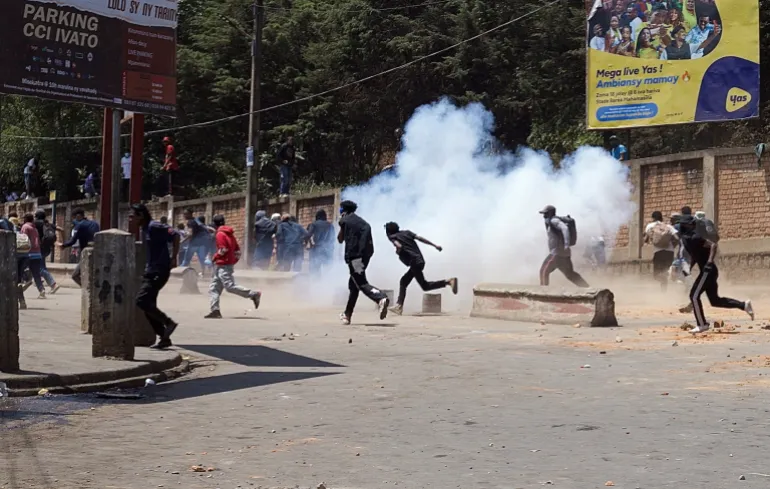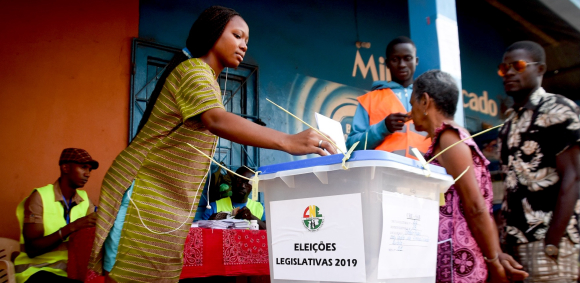The grief is still raw for Razanasoa Edmondine, who lost her one-month-old grandson after police fired tear gas during anti-government protests that have gripped Madagascar for the past two weeks. “It was just a normal Friday,” she told the BBC, recalling how her daughter-in-law, on her way to the market with the baby, got caught in the chaos as police dispersed demonstrators with tear gas. Seeking refuge in a nearby building, she and others were trapped when officers fired more canisters inside, filling the room with choking smoke. By the time they reached a hospital the following day, it was too late. “The baby was trying to cry, but no sound came out,” Edmondine said. “The doctor told us he had inhaled too much smoke. A couple of days later, he passed away.”
Her grandchild is among at least 22 people the United Nations says have been killed since the protests began, although President Andry Rajoelina’s government disputes the figure and has not released its own tally. Authorities have instead highlighted property damage estimated at more than $47 million as protests, initially sparked by anger over chronic water and electricity shortages, have escalated into broader unrest over corruption, unemployment, and rising living costs in one of the world’s poorest nations.
Witnesses accuse security forces of excessive violence, including firing live bullets at peaceful protesters. One father, Rabe, said his 20-year-old autistic son was shot dead while observing the chaos. “He must have slipped outside to see what was happening,” he said. “I don’t know much, but as far as I know, when someone raises their hands, it means they haven’t done anything wrong.” President Rajoelina has acknowledged the deaths but described the victims as “rioters” rather than peaceful demonstrators.
The unrest has paralyzed commercial activity in the capital. Business owners in central Antananarivo say the demonstrations have disrupted livelihoods. “I support Gen Z, but protests are not the solution,” said mobile phone repairman Laza Brenda. “When people demonstrate, I can’t do business.” Entrepreneur Ulrichia Rabefitiavana said her company was forced to postpone a major event involving 2,000 participants. The tourism industry, one of Madagascar’s top earners, has been particularly hard hit. “We normally operate at 60 to 70% occupancy, but now it’s down to 10%,” said François van Rens of the Radisson Hotel Group.
Across the city, frustration is visible. Water scarcity has become so severe that many families wash clothes in paddy fields or buy water from roadside sellers. Unemployment and poverty are widespread, with many young people surviving on just a few dollars a week. One young woman selling doughnuts said she earns the equivalent of $2.30 weekly to feed her four-year-old son. “I can only sell on weekends because someone else uses the spot during the week,” she said.
The youth-led movement, known as Gen Z Mada, is demanding President Rajoelina’s resignation and what they call “radical change” to address the country’s deepening crisis. One protest organiser told the BBC that daily life in Madagascar has become defined by insecurity and hopelessness. “To be young here, you have to be tough,” he said. “You live in fear of when your house will be broken into or when you’ll be attacked on the streets. It’s like your humanity has been stolen.”
Economics professor Hery Ramiarison of the University of Antananarivo attributes the crisis to decades of poor planning and underinvestment in education and job creation. “There is a huge employment problem among young people,” he said. “After 64 years of independence, three-quarters of the population have an education level below primary school.” He warned that Madagascar is caught in two vicious circles of poverty, one driven by weak economic growth and the other by chronic political instability that scares off investors and deepens hardship.
President Rajoelina has urged citizens to give him one year to fix the nation’s problems, promising to resign if he fails. But for many on the streets, patience has run out. “Once they’re in power, they forget us,” said Brenda from his roadside kiosk. “It’s always the same.”














Leave a comment